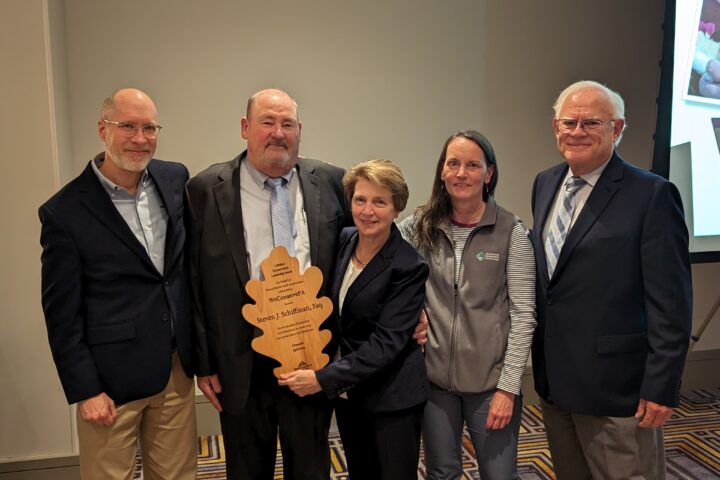Three finalists have been selected for the 2019 Pennsylvania Leopold Conservation Award.
Given in honor of renowned conservationist Aldo Leopold, the award recognizes farmers, ranchers, and foresters who inspire others with their dedication to land, water, and wildlife habitat management on private, working land.
In Pennsylvania, the $10,000 award is presented annually by the Sand County Foundation, Pennsylvania Farm Bureau, and Heinz Endowments.
The finalists are:
- Glen Cauffman of Millerstown in Perry County: Cauffman grows corn, soybeans, and alfalfa hay on a 190-acre farm with diverse topography and soils. A herd of 300 Angora goats produce luxury yarn for the fashion industry. No-till practices have been utilized since 1984 to prevent erosion, enhance water infiltration, and improve soil health. Cover crops and crop rotation provide ecosystem diversity. Wetlands were created to provide wildlife and bird habitat. Cauffman previously served as manager of Penn State University’s farm operation facilities.
- Mt. Glen Farm of Columbia Crossroads in Bradford County: Dean and Rebecca Jackson’s third-generation, 920-acre dairy farm has a long history of blending conservation with production agriculture. In the 1960s, Dean’s father installed contour strip cropping, planted trees and hedgerows, and preserved wildlife habitat. Today they also use prescribed grazing, innovative manure storage, cover crops, no-till planting, and grass borders around crop fields as ways to retain nutrients on the soil while protecting water quality.
- Troy Firth of Spartansburg in Crawford County: While managing more than 100,000 acres of Pennsylvania woodlands, Furth has shown that conservation forestry can be economically profitable and ecologically nurturing. Innovative approaches, like using horses to protect the forest floor during timber harvests, protect viable ecosystems and wildlife habitat. He and his late wife Lynn founded the Foundation for Sustainable Forests to assist other forest landowners in conserving working forests and promoting sustainable forestry practices.
The award will be presented at the Pennsylvania Farm Show in January.
“We are extremely proud of the three finalists, who have put a spotlight on how farm families across the Commonwealth are exceptional stewards of the land,” said Pennsylvania Farm Bureau President Rick Ebert. “Glen Cauffman, Dean and Rebecca Jackson, and Troy Firth have consistently demonstrated strong commitments to improving the environment through their conservation efforts. They are truly worthy of the recognition they have received.”
“The way Pennsylvania’s farmers and foresters operate has a tremendous impact on the quality of the soil and water we rely on for food and life,” Pennsylvania Agriculture Secretary Russell Redding said. “We are pleased to honor those whose ethic of conservation, and whose investments in innovation honor Aldo Leopold’s legacy and safeguard our future.”
“Leopold Conservation Award recipients are at the forefront of a movement by America’s farmers and ranchers to simultaneously achieve economic and environmental success,” said Kevin McAleese, Sand County Foundation president and CEO.
The first Pennsylvania Leopold Conservation Award was presented earlier this year to the DiFebo family’s Harvest Home Farms in Bangor.
The Leopold Conservation Award in Pennsylvania is made possible thanks to the generous contributions from platinum sponsor, Heinz Endowments, and the assistance and support of Pennsylvania Farm Bureau, USDA NRCS, Pennsylvania Department of Agriculture, Pennsylvania Association of Conservation Districts, Center for Dairy Excellence, Dairymen’s Association, and The Nature Conservancy in Pennsylvania.
Sand County Foundation presents the Leopold Conservation Award to private landowners in 20 states for extraordinary achievement in voluntary conservation.
In his influential 1949 book, A Sand County Almanac, Leopold called for an ethical relationship between people and the land they own and manage, which he called “an evolutionary possibility and an ecological necessity.”
For more information on the award, visit www.leopoldconservationaward.org.



